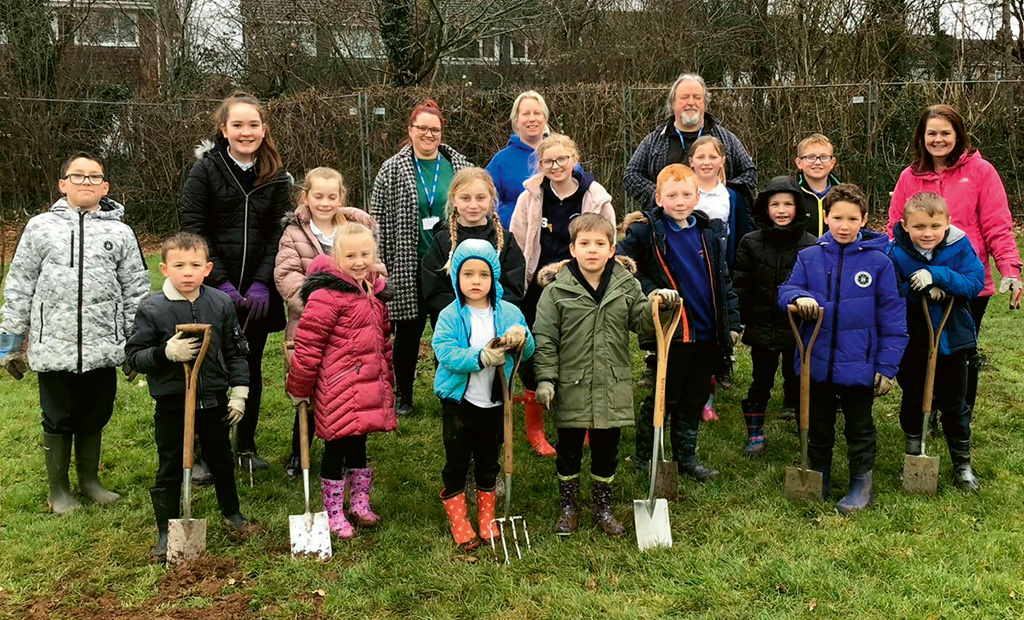‘The school are always supportive of our environmental initiatives’
At the Friends of Rathfern (FOR), we keep our environmental impact in mind when we run events or projects. Examples include selling pre-loved clothes and toys at our summer and winter fairs, buying reusable plates and cups to use at class parties, and sourcing a very generous donation of VOC-free paints from Little Knights to repaint our dinner hall and adjoining toilets. FOR has banked with the Co-operative Bank, which does not invest in fossil fuels, for many years.
Staff at Rathfern Primary School are proactive and forward-thinking regarding the climate crisis, and we have a great relationship with them. The school works directly with Let’s Go Zero, a campaigning organisation helping schools achieve net zero by 2030, so they are always supportive of our environmental projects.
Rathfern is also part of the School Streets initiative, meaning traffic is temporarily restricted at drop-off and pick-up times. This makes families feel safer and reduces immediate air pollution. A former FOR parent also ran an anti-idling campaign, which raised awareness of the effects of car emissions on children’s health and taught active ways to decrease air pollution.
Our most recent action has been to sign up for food waste collection with Lewisham Borough Council. The council offered food waste collection from homes for years and then trialled it at schools. When the trial ended and it became official, Rathfern signed up immediately. Now, pupils separate their food waste in the dining hall after eating and the council takes it away for recycling. Maria Georgiou, who helps supervise the children before and after school and during lunch and breaks, says it also helps the school understand the food pupils eat and what they dislike.
Our school was rated at high risk of flooding and secured a grant to dig up some of the concrete on the playground and replace it with gardens and trees. The Friends of Rathfern supported this transformation by donating money to buy gardening equipment. The gardens help the children connect with nature and reduce CO2. As the trees grow, they will provide shade as our planet heats up. The children love caring for the gardens.
Shireen Tawil, events lead, Friends of Rathfern, Lewisham, London (500 pupils)
‘Children were demanding spinach for tea. I was thrilled!’
I have been actively involved in gardening and promoting environmental awareness at Oakwood Primary for the past six years, starting when my oldest son was in Year 1. A few other mums and I decided to build six raised beds on a piece of waste ground. The children loved it as they moved up the school, and they clearly wanted to continue gardening. Recently, the school approached us to create a new growing space, which we gladly agreed to.
They allocated us a corner of the field where we have created five more raised beds. Inspired by the composting revolution of the Enrich The Earth campaign, we also installed four compost bins. Pupils fill them with cardboard, fruit and veg scraps from the school kitchen, and leaves and grass clippings. We also built a bug hotel from old pallets.
We run regular Lend a Hand days where families come along at the weekend to help with gardening duties, such as weeding, clearing and painting fences. The last time we ran one, a parent who works as a plumber set up a water butt system to capture rainwater from a gazebo in the playground. Another parent, a handyman, took charge of building the beds.
Funds to support this project come from the PTA running brilliant events, from discos and karaoke to quizzes and festive fairs. John O’Conner, the company that processes green waste in our area, donated free compost to fill the beds. We needed a considerable amount, so they saved us a lot of money.
In the beds, we have planted a range of herbs, such as mint, lavender, thyme and fennel, to create a sensory space. We aim to plant as many vegetable and fruit varieties as we can and hopefully have them ready for harvesting before the school summer holidays. We’re also hoping to create a circular wildflower bed to encourage pollinators.
The positive mental health benefits of being outside and in nature are well documented, and it’s important to us that the pupils can learn in the garden. It also helps children understand where their food comes from and the importance of conserving water, looking after and protecting nature, and encouraging biodiversity. It even encourages them to try new foods. After one session where the children ate the spinach they had grown, some shocked parents told me their children were demanding spinach for tea. I was thrilled!
The school has asked us to run sessions that link to the curriculum, for example, focusing on composting and biodiversity. Our next challenge is to get more parent helpers on board. Whether it’s a one-off or regular commitment, we’re grateful to those who can spare the time.
Laura Harrison, PTA member, Oakwood PTA, St Albans (320 pupils)
‘Knowing how to grow your own produce is a life skill’
At Raysfield, we are lucky to have outdoor space that includes a garden and a woodland area. But the woodland area had been neglected and was overgrown, the pond had a broken liner and the shed was condemned.
I have a passion for plants, which inspired me to improve the garden. A friend who lives adjacent to the school heard of my involvement and told me about the non-profit organisation One Planet Matters, which provides schools with free resources.
The requirements to join One Planet Matters’ Schools Network were pretty straightforward. All we needed to do was hold an annual non-uniform day to help raise funds and put the One Planet Matters logo on the school website. I approached the school and they were very keen.
I joined forces with Dilys Richardson, who leads the school’s eco projects. Dilys had some great ideas, which we continue to work on with our PTA Groundforce Team: parents and children who come in for a morning of gardening. One Planet Matters also helps implement ideas by providing activities with links to the curriculum.
Over the summer and autumn, we removed the broken shed, cut everything back to create a usable teaching space, cleared the overgrown beds and improved the pathways. Then in February 2023, our mini orchard was delivered. Dilys and I arranged for the pupils to plant the new fruit trees in holes we had dug on Groundforce Day. Shortly after, One Planet Matters delivered wildflower plugs to begin turning the orchard area into a biodiverse meadow.
We believe that all children should have the opportunity to learn how to grow their own produce, as it is a valuable life skill, but not all families have the necessary space or time. Raysfield has an ongoing partnership with food redistributors FareShare, so we pass any produce grown to families in need.
After planting the orchard, I contacted a local newspaper to share the news and hopefully inspire other schools to start similar projects. Kevin Thomas, founder of One Planet Matters, also reached out to me and I joined their team. Recently I’ve been working to create a new Schools Network Awards Scheme. The network currently includes around 20 schools in the south west, South Wales and Derbyshire and we are hoping to attract more schools to work with us.
Holly Woodruff, secretary, Friends of Raysfield, Chipping Sodbury (420 pupils)







